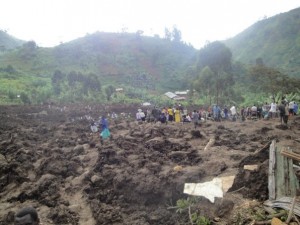(Marihina fa tamin'ny volana Martsa 2010 no nivoahan'ny lahatsoratra teny Anglisy)
Olona miisa 80 farafahakeliny no maty ary mihoatra ny 300 no tsy hita tany atsinanan'i Ogandà ny alatsinainy hariva noho ny fihotsahan'ny ranom-potaka . Ny fihotsahan'ny ranom-potaka vokatry ny oram-batravatra dia nitelina tanànakely telo tao amin'ny distrikan'i Bududa ary namindra olona maherin'ny 2.000 niala ny tranony. Mbola nitohy ny fikarohana [1] ho an'ireo sisam-paty ny Alarobia maraina.
Nanambara ny Daily Monitor [2]ao Oganda fa voalaza fa nisy ny tondradrano nanerana ny faritra atsinanan'ny firenena, ka nanery ny sekoly hikatona sy nahatonga ny lalana ho tsy azo aleha. Mbola nitohy anefa ny orana, ary nitatitra ny Reuters [3] fa matahotra ny manampahefana Ogandey fa mety hisy fiantraikany any amin'ny distrika miisa dimy hafa ny tondradrano sy ny fihotsahan'ny ranom-potaka.
Namela tanànakely miisa telo tao anaty fotaka ny fihotsahan'ny tany tany atsinanan'i Oganda. Sary natolotr'i Apollo tao amin'ny Facebook [5].
Rosebell [6] , bilaogera Ogandey, nanontany tena hoe nahoana ny governemanta no tsy nanao ezaka bebe kokoa tamin'ny fanalana ny olona tao amin'ny faritra:
There are estimated 50,000 people, some occupying the immediate precincts of the extinct volcano, who are regularly exposed to the threat from landslides. Every rainy season there are deaths in this part of Uganda but the only approach has been that of conservation of the national park to relocate people.
There has been no government effort to really try to find other ways to persuade these people and find them alternative livelihoods. In a place where many people depend on farming relocating from the fertile volcanic soils is difficult decision. So they live one day at a time and hope they survive the next rainy season.
Olona miisa 50 000 eo ho eo, mipetraka eo ampototry ny volkano efa maty ny sasany amin'izy ireo, no voarahon'ny fihotsahan'ny tany matetika. Misy fahafatesan'olona ao amin'ity faritra Ogandà ity isaky ny vanim-potoanan'ny orana saingy ny hiarovana ny valan-javaboaram-pirenena ihany no antony namindrana toerana ny olona.
Tsy nisy ezaka nataon'ny governemanta mba hitadiavana marina ny fomba hafa handresen-dahatra ireo olona ireo sy hitadiavana fomba hafa hiveloman'izy ireo. Sarotra ny fanapahan-kevitra ho an'ireo olona maro izay miankina betsaka amin'ny fambolena amin'ny tany volkano mahavokatra ny fotom-pivelomany. Noho izany dia mitady izay hohaniny isan'andro izy ireo ary manantena ny vanim-potoan'ny orana manaraka indray amin'ny famboleny.
Ao afovoan'i Ogandà, izay tsy dia atahorana loatra ny orana dia nanoratra i Gay Uganda [7] hoe:
The rains which I was so guiltily taking joy in are taking a toll on my people. I can only pray. Uh, you know what I mean. I do love rain, but rain comes with its blessings and curses. A bumper harvest may be [8] one thing to be happy about. Terrible loss of life [9]- but, incredibly, life goes on.
Namely ny mpiray tanindrazana amiko ny orana izay raisiko amim-pifaliana kanefa manenjika ny eritreritro. Ny mivavaka sisa no ataoko. Ary, fantatrao ny tiako hambara. Tiako ny orana, kanefa tonga miaraka amin'ny fitahiana sy ny ozona izany. Mety hahafaly ny fijinjana vokatra [8] miroborobo. Kanefa mitohy ny fiainana na dia eo aza ny fahafatesan'olona mampalahelo – na dia tsy mampino aza.
